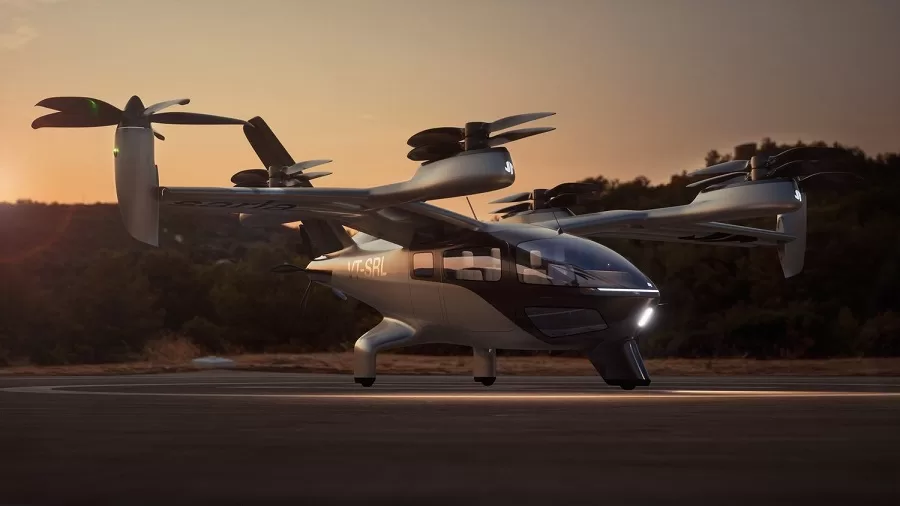Travel
How Bengaluru is Pioneering the Future of Air Travel with Electric Flying Taxis

- Bengaluru’s Kempegowda International Airport has teamed with Sarla Aviation to provide electric flying taxis, establishing the city as a leader in sustainable urban mobility.
- The program aims to minimise travel time and carbon emissions by providing inexpensive trips, which might cost roughly £20 for a 19-minute flight.
- This pioneering step, which incorporates advanced technology while assuring safety, promises to alter urban mobility and inspire similar projects around the world.
Kempegowda International Airport (BLR) in Bengaluru has teamed with Sarla Aviation to introduce electric flying taxis, marking a watershed moment in air transport history. This effort is expected to transform transport in India, establishing Bengaluru as a significant player in the global move towards sustainable urban mobility.
Bengaluru Is an Emerging Aviation Hub
Bengaluru is already an important gateway to India, processing over 500 flights each day and expecting over 40 million passengers by 2023. This strong traffic volume cements the airport’s reputation as one of the busiest in the country. The inclusion of electric flying taxis not only improves the airport’s prestige, but also aligns it with global trends that seek to provide sustainable alternatives to traditional road transport.
A Seamless and Environmentally Friendly Travel Experience
The collaboration between BLR Airport and Sarla Aviation seeks to provide an efficient and ecologically responsible travel experience. The electric flying taxis, which are outfitted with cutting-edge technology, would enable speedy point-to-point transportation around Bengaluru and its neighbouring areas. This program is expected to reduce traffic congestion, shorten travel times, and reduce carbon emissions, creating a model for other cities to follow.
As Bengaluru takes the lead in India, cities throughout the world, including Los Angeles and Dubai, are looking at similar urban air mobility initiatives. These projects highlight a shared desire to revolutionise urban mobility by leveraging sustainable energy technologies.
Affordable and Convenient Transportation Options
Rides in the electric flying taxis will be reasonably affordable, with estimates indicating that fares may rival or even undercut standard taxi services. For example, a trip from Kempegowda International Airport to Electronics City, which normally takes over 150 minutes by road, is estimated to take only 19 minutes and cost approximately £20. This new mode of transportation combines affordability and unsurpassed ease, thanks to its environmental friendliness and time-saving characteristics.
Pioneering Urban Air Mobility
The launch of electric flying taxis is a tremendous commitment to innovation and sustainability for Bengaluru, ushering in a new era of air transport. This collaboration represents a significant step towards blending cutting-edge technology and environmental consciousness, resulting in a more efficient and sustainable future for urban transportation.
Economic and Environmental Impacts
The advent of electric flying taxis at Bengaluru Airport is expected to have a significant impact on both the local economy and the environment. Economically, this program is expected to offer a large number of job possibilities, ranging from pilots and maintenance crews to operations personnel and technology developers. As the demand for competent aviation and technology workers develops, Bengaluru has the potential to cement its position as an innovation and employment powerhouse.
Electric vertical take-off and landing (eVTOL) vehicles are designed to emit as little carbon as possible, in line with global sustainability targets. The aviation industry is increasingly concerned with lowering its carbon footprint, and electric flying taxis represent a promising alternative to traditional fossil-fuel-powered aircraft. This transition promotes climate action and increases the attraction of air travel in the face of growing environmental concerns.
Ensure Safety and Regulatory Compliance
To ensure the safety of electric flying taxis, Bengaluru Airport officials are working closely with the Directorate General of Civil Aviation (DGCA) and other stakeholders to develop a strong regulatory framework. Safety is a primary priority, and extensive testing and certification procedures will be carried out before these aerial vehicles take to the air.
Passengers will get pre-flight briefings and emergency procedures. The incorporation of new technology, including as automatic navigation systems and real-time monitoring, will improve the safety and dependability of these flying taxis.
Transforming The Travel Experience
In addition to economic and environmental benefits, electric flying taxis promise to improve the overall travel experience. With a focus on comfort and convenience, these air taxis will have roomy interiors and modern amenities. Passengers will be able to book rides through a mobile app, similar to existing ride-hailing services, assuring a smooth and user-friendly experience.
As urban air mobility becomes a reality, regular air travel will have to change to accommodate eVTOL operations. This transition may result in new airport infrastructure upgrades and amended flight schedules, fostering collaboration between established airlines and alternative mobility providers to build a more interconnected travel ecosystem.
Conclusion
Bengaluru’s effort to develop electric flying taxis is a significant step towards the future of air transport. By adopting cutting-edge technology and ecological practices, the city is putting itself at the forefront of the urban air mobility revolution. As this effort progresses, it has the potential to revolutionise not only the travel experience for passengers, but the whole aviation sector. The successful implementation of electric flying taxis may encourage other cities to follow similar technologies, altering our view of urban mobility.
Bengaluru is setting new milestones in reliability and performance in the domain of sustainable aviation, led by Sarla Aviation, which was created by Adrian Schmidt, Rakesh Gaonkar, and Shivam Chauhan. As cities throughout the world struggle with traffic congestion and pollution, Bengaluru’s pioneering efforts in electric flying taxis may serve as a paradigm for a more connected and ecologically responsible future.




















































